- Unit 4 -
4.1 Interview for a job
Miss Smith is applying for a job as export sales representative for Thames Cosmetics. Mr Brown, the export director is interviewing her.
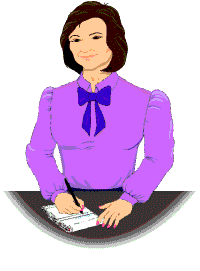
- Mr Brown:
- Come in ...come in. Ah, it's Miss Smith, isn't it?
- Miss Smith:
- Yes, that's right. How do you do?
- Mr Brown:
- How do you do? Take a seat please.
- Miss Smith:
- Thank you.
- Mr Brown:
- Now then, you're applying for the position of export sales representative. I'd like to ask you a few questions first. Where were you born?
- Miss Smith:
- I was born in West Meon, it's a very small village near Southampton.
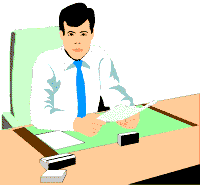
- Mr Brown:
- Really! I come from that area myself. Did your parents come from that area?
- Miss Smith:
- No, they came from Scotland, from Edinburgh, but they moved to West Meon the year that I was born.
- Mr Brown:
- Mm. Did you go to school in West Meon?
-
Miss Smith:
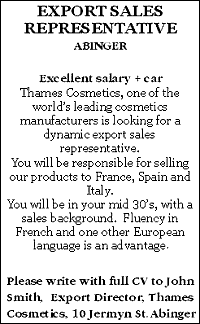 Yes, I went to primary school in West Meon and I went to secondary school in Southampton.
Yes, I went to primary school in West Meon and I went to secondary school in Southampton.
- Mr Brown:
- And what did you do after leaving school?
- Miss Smith:
- After leaving school I spent one year working as a tourist guide in Paris and then I studied economics at Southampton University.
- Mr Brown:
- What about after university?
- Miss Smith:
- After that I worked for 3 years as a sales representative for Levron Cosmetics. I enjoyed the work very much, but I stopped in 1989 when my first child was born.
- Mr Brown:
- But you're working now, aren't you?
- Miss Smith:
- Yes, I went back to work in 1993, when my children started kindergarten.
 Mr Brown:
Mr Brown:
- Tell me about your present job.
- Miss Smith:
- I work for Pierre Garden, the French cosmetics company. I work in the salesdepartment as area sales manager. My official job title is Area Sales Manager, Scotland.
I'm responsible for sales in Scotland. The job involves a lot of meetings with the sales representatives in the area. I also travel quite a lot, to our head office in France and to my sales areas. I report to the Marketing Director. I've been with the company since January 1994.
- Mr Brown:
- And why do you want to change your job?
 Miss Smith:
Miss Smith:
- I speak French, German, Spanish and a little Russian, and so I want a job where I can use my foreign languages.
- Mr Brown:
- Is there anything that you want to ask me about this job?
- Miss Smith:
- Yes. How many countries does your company export to?
- Mr Brown:
- We export to more than 70 countries. I'm glad you asked that question, most people today are only interested in money and the first question they ask is "How much is the salary?".
- Miss Smith:
- How much IS the salary?
| KEY PHRASES
|
| Take a seat, please.
I was born in...
I come from...
After leaving school I...
I worked as a ...
My official job title is ...
I'm responsible for...
My job involves...
|
4.6 Talking about your company
Mr Brown is telling Miss Smith about the company
- Miss Smith:
- Perhaps you could tell me about Thames Cosmetics, Mr Brown.
 Mr Brown:
Mr Brown:
- Certainly, delighted. Thames Cosmetics was founded in 1985, so it's a fairly young company.
- Miss Smith:
- It's a very big company now, isn't it?
- Mr Brown:
- Oh yes. We're the third biggest cosmetics company in Britain. Altogether we employ over 6,000 people. Here, at our head office in Abinger we have 300 office personnel and 1,400 people work in the factory here.
- Miss Smith:
- How many factories have you got altogether?
- Mr Brown:
- We've got 4 factories altogether. 3 in England and 1 in France. The main products at this factory are soaps, lipsticks, nail varnish and face creams. The factory in Scotland produces men's toiletries, the factory near Oxford produces our hair care products, and the factory in France produces perfumes.
- Miss Smith:
- What are your biggest selling products?
- Mr Brown:
- Our biggest selling products are soaps, shampoos and toothpaste. Our company has three divisions, men's products, women's products and hair-care.
- Miss Smith:
- What was the turnover last year?
- Mr Brown:
- Last year was a record year for us. Our turnover last year was just over £200 million. Exports were about £50 million.
- Miss Smith:
- What are your main export markets?
- Mr Brown:
- We export mainly to Europe, France, Germany and Italy are the most important countries, but we also export to the United States and to the Middle East. We've got subsidiaries in Paris, Frankfurt and New York, and we have sales offices in 40 other countries.
4.17 Reading for Pleasure - Scotland
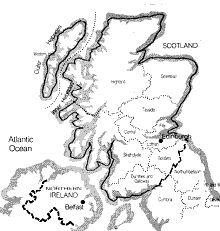 Scotland is the second largest of the countries of the United Kingdom, England is, of course, the largest. Scotland, together with its islands, covers an area of 70,000 square kilometres, which is nearly 4 times the size of Wales and more than half the size of England.
Scotland is the second largest of the countries of the United Kingdom, England is, of course, the largest. Scotland, together with its islands, covers an area of 70,000 square kilometres, which is nearly 4 times the size of Wales and more than half the size of England.
Scotland has three main regions: the sparsely populated highlands and islands in the north, the central lowlands in the middle of the country, and the southern hilly region just north of the border between England and Scotland.
The population of Scotland is just over 5 million and about 75% of the population lives in central Scotland. The capital city of Scotland is Edinburgh, a very old city with a rich cultural heritage. One of the world’s leading cultural events, the Edinburgh Festival takes place annually. The Edinburgh Festival attracts tens of thousands of visitors from all over the world. They come to listen to the opera, to hear musical concerts, classical and modern, to watch ballet and to go to the theatre.
They speak English in Scotland, but with a very strong Scottish accent. There are many different regional accents in Scotland, some are easier to understand than others. People from southern England sometimes find it difficult to understand Scottish highlanders when they speak English. In the highlands and islands about 80,000 people use the Gaelic language. This is a very old language of Celtic origin. There are even some television and radio programmes in Gaelic, but it is not an official language.
The Scottish economy is strong. In the early 1970’s the North Sea oil industry started, and this brought over 100 000 new jobs and a lot of much needed money to Scotland. The Scottish economy also includes some traditional industries, for example high quality clothing and the food and drink industry. Scotch whiskey is an important export and there are more than 100 whiskey distilleries in Scotland. Agriculture is also important. There is much cattle and sheep farming and Scotland also has over half of Britain’s forests.
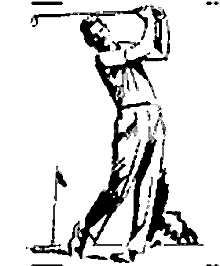 Tourism is big business in Scotland. Over 130,000 jobs come from the tourist industry. Scotland has a lot to offer tourists - magnificent scenery and also sport. Golf is a Scottish game and tourists come from all over the world to play on the golf courses in Scotland. There are hundreds of golf courses in Scotland including the famous golf courses at St. Andrews, the Mecca for golfers.
Tourism is big business in Scotland. Over 130,000 jobs come from the tourist industry. Scotland has a lot to offer tourists - magnificent scenery and also sport. Golf is a Scottish game and tourists come from all over the world to play on the golf courses in Scotland. There are hundreds of golf courses in Scotland including the famous golf courses at St. Andrews, the Mecca for golfers.
Golf is not the only major sport in Scotland. Downhill skiing is also a major tourist attraction. There are many skiing resorts in the Scottish mountains.
And there is still one more attraction which also brings visitors to Scotland - the Loch Ness monster - but, so far, nobody has ever seen it.
Vocabulary
Epäsäännölliset Verbit
Takaisin alkuun
Takaisin etusivulle



 Yes, I went to primary school in West Meon and I went to secondary school in Southampton.
Yes, I went to primary school in West Meon and I went to secondary school in Southampton.
 Mr Brown:
Mr Brown:
 Miss Smith:
Miss Smith:
 Mr Brown:
Mr Brown:
 Scotland is the second largest of the countries of the United Kingdom, England is, of course, the largest. Scotland, together with its islands, covers an area of 70,000 square kilometres, which is nearly 4 times the size of Wales and more than half the size of England.
Scotland is the second largest of the countries of the United Kingdom, England is, of course, the largest. Scotland, together with its islands, covers an area of 70,000 square kilometres, which is nearly 4 times the size of Wales and more than half the size of England.
 Tourism is big business in Scotland. Over 130,000 jobs come from the tourist industry. Scotland has a lot to offer tourists - magnificent scenery and also sport. Golf is a Scottish game and tourists come from all over the world to play on the golf courses in Scotland. There are hundreds of golf courses in Scotland including the famous golf courses at St. Andrews, the Mecca for golfers.
Tourism is big business in Scotland. Over 130,000 jobs come from the tourist industry. Scotland has a lot to offer tourists - magnificent scenery and also sport. Golf is a Scottish game and tourists come from all over the world to play on the golf courses in Scotland. There are hundreds of golf courses in Scotland including the famous golf courses at St. Andrews, the Mecca for golfers.